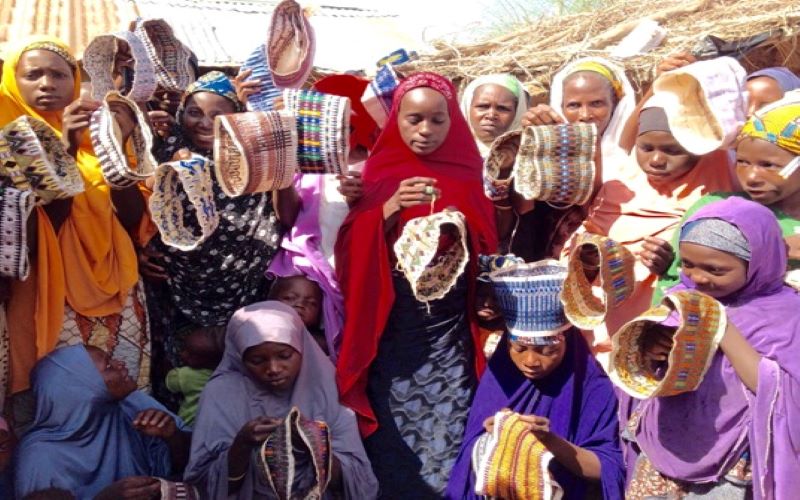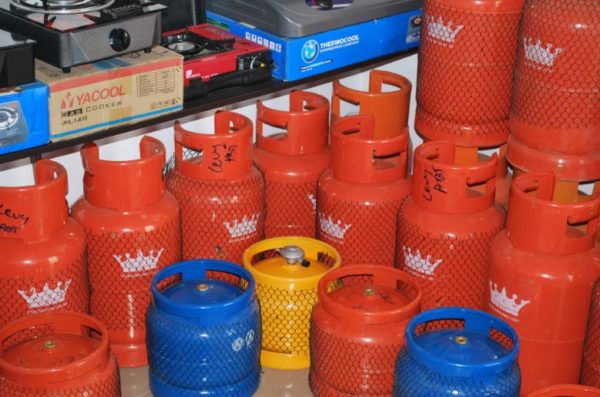
In Nigeria’s north, women have traditionally been in the back seat due to some tight conservative sharia customs, making them dependent to the men.
Now the caps, popular among Nigeria’s top-cream personalities are routinely being churned out by the women, symbolic of their rise from the restrictions, but also as a sign of creative talent among them.
These days, the source of the caps is Jigawa, a predominantly Muslim state of almost five million people or Bama in North East Borno state although men are predominant crafters there. The caps come with varied names such as fila, hula or yaudi, depending and are known for their sleek embroidery.
Nigeria’s famous personalities, including President Muhammadu Buhari wear them. Politicians, musicians or movie stars and other influencers don them. It is a habit among these people to combine the decorative hand-embroidered caps with other traditional dresses or western-style suits.
Each cap starts with a design template that is sketched by hand, using a ruler and coloured markers. Depending on the number of layers in the design, a cap can take from two to five weeks to weave. Everything is done by hand.
The motivation behind women’s rise to this art may be out of need: Seeking a livelihood. This state which borders Niger Republic in the north had traditionally relied on pastoralism and subsistence agriculture. But climate change and insecurity have combined to condemn locals to poverty. Arable land is now scarce and herdsmen routinely engage in deadly clashes with farmers, fighting over available pastureland; a result of irregular droughts or floods that have become common.
The people here are predominantly Hausa and Fulani, conservative and run on sharia. Women participation in economic activities, even as weavers was always unheard of.
Now young women seem to be skirting around the challenge of conservatism and opting for weaving to make ends meet. They have taken on Nigeria’s popular dresses, handcrafting designs for the caftan and agbada, with the caps to match. In Nigeria, it is common these days to see people donning special caps on these dresses or Western-style suits.
Jigawa wasn’t the first to produce these caps. It has just taken the lead in fronting women to produce them, eclipsing other states. In Gurduba Village under the Kiyawa Local Government Area, women assemble at a factory every morning to weave caps, by hand.
Finished pieces are then shipped to Shuwarin International Market, in Shuwarin town in the Local government area, the main centre where the caps are distributed to other parts of Nigeria.
The women say they learnt the skills from their patents who in turn inherited the talent from their fore generations.
Hajara Mohammed, 20, says she decided to weaving to earn money from it as other sources of income dried. Married, she said relying on her husband for upkeep was no longer enough for the family.
“Farming became difficult because of flooding and bandits invaded our land and started kidnapping people,” she said.
“I decided to join other young women in the trade. It has helped me get some money which has supplemented what my husband gets.”
The women have to get used to the tedious work of using hands. It takes long and requires maximum concentration to produce a neat piece of art.
Yet this commitment, time spent and skill used doesn’t always get rewarded financially. Each of the women taking part in the embroidery know they have to weave caps to be sure of the next meal. Middlemen are the biggest winners in this trade that relies on ability to deliver pieces to the faraway markets.
As they have no access to seed money or capital to buy machinery, the handiwork which is popular earns them little. The huge chunk of the profit goes to those who buy from them and distribute across the country.
Aisha Adamu, 23, says she has been weaving caps since she was 14. But she has seen a recurrent problem every year: a demand for mass production still dependent on hand.
“If we have the equipment and the necessary training, we can make more money and we will be empowered to support our families,” she says.
The cap weavers have, for the first time, formally appealed to the state and federal governments to include them in the economic empowerment programmes to enable them to access loans which they will repay from the proceeds of the cap business.
“Most of us are poor, we collect the textile materials and the threads used in the production of the caps on credit from traders in Shuwarin market.
“The textile material cost $2.4 (N1,200) each, while the threads cost between $1.2 (N700) and $3.1 (N1,900) per roll, depending on quality and brand,” Ms Adamu said.
The women say they sell their caps at between $7 (N3,500) and $10 (N5,000) depending on the quality. But middlemen who buy these caps and take them to cities sell them at between $20 (N10,000) and $45 (N25,0000).
Some of the high grade quality caps are sold to politicians and high profile business people and celebrities for between $300 (N150,000) and $500 (N250,000), she said.
Hajara Hamza, 35, never went past primary school and picked up weaving as soon as she got married. She says the women can do better if they access the city markets directly.
“If we get there, we can make meaningful profit,” she says.
Government support towards mass production that targets these markets and exports can be crucial, Hamza says.
“People from beyond Nigeria are buying them. If we get support, we can reach those markets.”
Nigerian officials say the opening up of the continental market through initiatives like the Africa Continental Free Trade Area agreement [AfCTA] can help these women. But there is always a mismatch between deed and say.
As it is, the earnings from the trade are either too small or used almost entirely to support families, leaving little for savings or investment. Mrs Maryam Abdullahi, 48, has been in the business for 26 years. She says she has been using the proceeds from the sales to take care of her children’s education.
“The government support to us will encourage us to produce more explore new markets for the caps. We can improve our lives.”
Mr Olusegun Runsewe, the Director-General of National Council for Arts and Culture (NCAC), admits the craft can help reduce unemployment and poverty.
“We at the NCAC are convinced that there are vast opportunities in the arts and crafts sector that government would harnessed to create jobs, empower our people and drive the process of economic development.
“One unique advantage of the industry is its capacity to accommodate the educated and the uneducated, the young and the old, the able bodied and the physically challenged alike as well as the rural and urban dwellers.
Vice President Yemi Osinbajo recently promised that the Federal Government will create a friendly environment for small and medium enterprises.
At the inauguration of Fashion Cluster Shared Facility for Micro Small and Medium Enterprises(MSMEs), in Lagos in late July, he suggested that there will be an Economic Sustainability Plan (ESP) which will provide credit through the Survival Fund for smaller enterprises like the women handcrafters.
He just didn’t give timelines.













